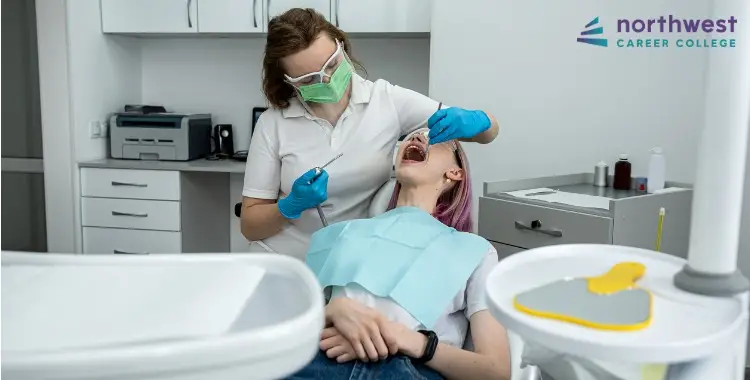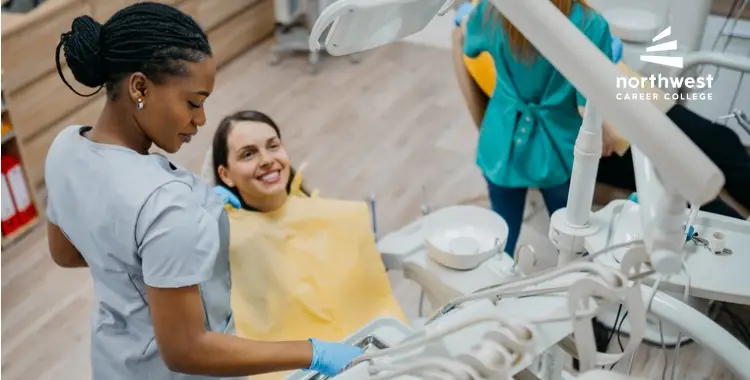Dental Assistants’ Role in Preventive Dentistry
- Dental Assistant
- March 12, 2024
- 3.1k views
- 4 min read

Anyone who has ever had a dental appointment knows…Patients interact with dental assistants more than anyone else in the dental office. As a result, dental assistants have the most opportunities to educate patients about the most important topics related to their dental care.
Effective hygiene practices are essential to the effectiveness of preventative dentistry programs, so patient education is a core responsibility of most dental assistants. Read on for more information about how dental assistants can contribute to preventative dentistry.
Table of Contents
Educating Parents about Preventative Dentistry for Children
Good oral hygiene starts during childhood. Dental assistants and dentists are responsible for ensuring that parents know what to do and why supporting their children’s oral health is vital.
Parents need to take oral hygiene for primary teeth, i.e., “baby teeth,“ seriously, as many parents do not understand that the health of primary teeth can directly impact permanent teeth’ long-term health. Extensive disease in primary teeth can prevent permanent teeth from developing properly and cause years of issues for the child as they grow older.
Equally important is establishing good habits related to oral hygiene during childhood. Children who regularly floss and brush during childhood typically bring those good habits into adulthood.
Dental assistants should verify children’s and parents’ effectiveness at brushing and flossing at every dental visit and either reinforce their current technique or demonstrate more effective techniques to help improve their home care abilities.
Finally, educating parents about good dietary practices for their children is essential. Dental assistants should emphasize the importance of avoiding high-sugar foods, especially before bed, as these significantly contribute to dental disease.
Preventative Dentistry Procedures for Children
In addition to educating parents about good oral hygiene practices they can implement at home, dental assistants must also inform parents about treatments that can be done in the office to support good oral health for their children.
This starts with having regular checkups for children, which are recommended to start once they get their first baby tooth and every six months after that. During those exams, the pediatric dentist will be able to ensure that no active disease needs to be addressed. They will also be able to offer the preventative dental treatments listed below.
The most common preventative dentistry treatment is dental prophylaxis, i.e., “prophy.” Prophys involve cleaning the teeth’ surface with special paste and equipment that provides an even deeper clean than typical toothbrushes. It also involves a thorough flossing between the teeth, if any are touching each other.
Another core preventative dentistry treatment is the application of fluoride varnish. Fluoride treatments are essential during early childhood development, as fluoride improves the mineralization of primary and permanent teeth in children. This increased mineralization can minimize the risk of cavities, i.e., “caries,” in children and adults.
The third preventative dentistry treatment frequently recommended for children is dental sealants. Dental sealants are a flowable composite, i.e., “plastic,” placed on the chewing surface of the tooth to cover the pits and grooves in posterior teeth.
Sealants can protect hard-to-clean surfaces of the teeth from the bacteria that cause decay. Dental sealants have been proven safe and are recommended by the American Dental Association.
Preventative Dentistry in Adults
As people age, their oral hygiene needs change. Adults are more likely to develop cavities at a greater rate than children. They are at increased risk for other diseases, such as gingivitis or periodontitis, with an associated recession of the gums. Adults also take more medication than children, which can cause dry mouth and further increase the risk of dental disease.
As a result, dental assistants must continue educating patients about the importance of nutrition to their oral health. They must also educate them about maintaining good oral hygiene habits to control plaque on teeth. Doing so reduces instances of periodontitis and dental caries.
Conclusion
As is evident, there are several key areas that dental assistance must educate children and adults about related to preventative dentistry. Patients can significantly reduce their risk of dental and periodontal disease by implementing small daily practices such as flossing, brushing twice daily, and reducing the frequency of consuming high-sugar foods and beverages.
There are many other considerations about which dental assistants must educate patients after they have treatment to reduce the risk of further disease or failure of the treatment. However, these maintenance considerations extend beyond the scope of preventative dentistry.





